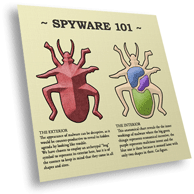What is Spyware?
Today, anyone who uses a computer is in danger of falling prey to spyware and malware. Recent studies show that as many as 90 percent of home computers have been infected with spyware. Are you susceptible?
Defining Spyware
Spyware is a program installed on your computer, with or without your permission, that can change system configurations, monitor your Internet activity and broadcast the information back to an outside party. Sluggish computer performance, altered home pages, and endless pop-ups are all signs your PC is infected. The milder forms of spyware, known as adware, are simply annoying, with increased spam and unwanted pop-ups. Malware refers to more malicious programs that can rob your PC of its ability to run efficiently, and put you in danger of financial loss and even identity theft. The most harmful forms can collect, use and distribute your personal information, like banking passwords and credit card numbers.
Today, as cyber criminals increasingly set their sights on financial gain, spyware is more and more pervasive and stealthy. By all counts, the amount of malware online grows exponentially on a daily basis. At the same time, the industry itself is evolving, with cyber crime growing in sophistication and even mimicking real-world crime tactics. Malware writers are now stealthily blending threats - made up of different types of malicious software, combining traditional forms of spyware with traditional forms of viruses - in order to infiltrate PCs.
Methods of Infection
The most common methods of infection are through exploits of unpatched operating systems, web browsers, and application/software programs. Other methods of attack include e-mail, peer to peer file sharing, downloading, and instant messaging. Spyware can worm its way into your computer even if you are careful while surfing the Internet. Malicious applications are typically bundled as a hidden component of freeware or shareware programs that can be downloaded from media-supported sites.
How to Stay Safe
The best ways to stay safe online are to prepare your PC, and to use caution and common sense online. Along with having the right tools in place on your computer - at the minimum free spyware removal software, anti-virus software, and a firewall, you should also be aware of online safety tips that can help prevent infections.



